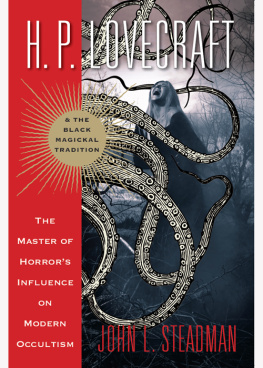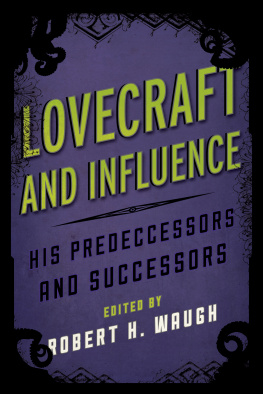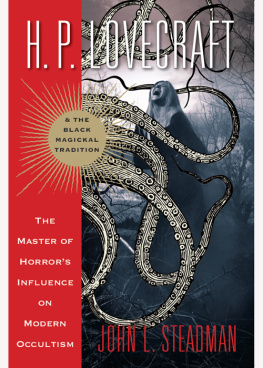Howard Lovecraft - The Street
Here you can read online Howard Lovecraft - The Street full text of the book (entire story) in english for free. Download pdf and epub, get meaning, cover and reviews about this ebook. genre: Science fiction. Description of the work, (preface) as well as reviews are available. Best literature library LitArk.com created for fans of good reading and offers a wide selection of genres:
Romance novel
Science fiction
Adventure
Detective
Science
History
Home and family
Prose
Art
Politics
Computer
Non-fiction
Religion
Business
Children
Humor
Choose a favorite category and find really read worthwhile books. Enjoy immersion in the world of imagination, feel the emotions of the characters or learn something new for yourself, make an fascinating discovery.

- Book:The Street
- Author:
- Genre:
- Rating:3 / 5
- Favourites:Add to favourites
- Your mark:
- 60
- 1
- 2
- 3
- 4
- 5
The Street: summary, description and annotation
We offer to read an annotation, description, summary or preface (depends on what the author of the book "The Street" wrote himself). If you haven't found the necessary information about the book — write in the comments, we will try to find it.
The Street — read online for free the complete book (whole text) full work
Below is the text of the book, divided by pages. System saving the place of the last page read, allows you to conveniently read the book "The Street" online for free, without having to search again every time where you left off. Put a bookmark, and you can go to the page where you finished reading at any time.
Font size:
Interval:
Bookmark:
The Street
by Howard Philips Lovecraft
There be those who say that things and places have souls, and there be those who say they have not; I dare not say, myself, but I will tell of the Street.
Men of strength and honour fashioned that Street: good valiant men of our blood who had come from the Blessed Isles across the sea. At first it was but a path trodden by bearers of water from the woodland spring to the cluster of houses by the beach. Then, as more men came to the growing cluster of houses and looked about for places to dwell, they built cabins along the north side, cabins of stout oaken logs with masonry on the side toward the forest, for many Indians lurked there with fire-arrows. And in a few years more, men built cabins on the south side of the Street.
Up and down the Street walked grave men in conical hats, who most of the time carried muskets or fowling pieces. And there were also their bonneted wives and sober children. In the evening these men with their wives and children would sit about gigantic hearths and read and speak. Very simple were the things of which they read and spoke, yet things which gave them courage and goodness and helped them by day to subdue the forest and till the fields. And the children would listen and learn of the laws and deeds of old, and of that dear England which they had never seen or could not remember.
There was war, and thereafter no more Indians troubled the Street. The men, busy with labour, waxed prosperous and as happy as they knew how to be. And the children grew up comfortable, and more families came from the Mother Land to dwell on the Street. And the children's children, and the newcomers' children, grew up. The town was now a city, and one by one the cabins gave place to housessimple, beautiful houses of brick and wood, with stone steps and iron railings and fanlights over the doors. No flimsy creations were these houses, for they were made to serve many a generation. Within there were carven mantels and graceful stairs, and sensible, pleasing furniture, china, and silver, brought from the Mother Land.
So the Street drank in the dreams of a young people and rejoiced as its dwellers became more graceful and happy. Where once had been only strength and honour, taste and learning now abode as well. Books and paintings and music came to the houses, and the young men went to the university which rose above the plain to the north. In the place of conical hats and small-swords, of lace and snowy periwigs, there were cobblestones over which clattered many a blooded horse and rumbled many a gilded coach; and brick sidewalks with horse blocks and hitching-posts.
There were in that Street many trees: elms and oaks and maples of dignity; so that in the summer, the scene was all soft verdure and twittering bird-song. And behind the houses were walled rose-gardens with hedged paths and sundials, where at evening the moon and stars would shine bewitchingly while fragrant blossoms glistened with dew.
So the Street dreamed on, past wars, calamities, and change. Once, most of the young men went away, and some never came back. That was when they furled the old flag and put up a new banner of stripes and stars. But though men talked of great changes, the Street felt them not, for its folk were still the same, speaking of the old familiar things in the old familiar accounts. And the trees still sheltered singing birds, and at evening the moon and stars looked down upon dewy blossoms in the walled rose-gardens.
In time there were no more swords, three-cornered hats, or periwigs in the Street. How strange seemed the inhabitants with their walking-sticks, tall beavers, and cropped heads! New sounds came from the distancefirst strange puffings and shrieks from the river a mile away, and then, many years later, strange puffings and shrieks and rumblings from other directions. The air was not quite so pure as before, but the spirit of the place had not changed. The blood and soul of their ancestors had fashioned the Street. Nor did the spirit change when they tore open the earth to lay down strange pipes, or when they set up tall posts bearing weird wires. There was so much ancient lore in that Street, that the past could not easily be forgotten.
Then came days of evil, when many who had known the Street of old knew it no more, and many knew it who had not known it before, and went away, for their accents were coarse and strident, and their mien and faces unpleasing. Their thoughts, too, fought with the wise, just spirit of the Street, so that the Street pined silently as its houses fell into decay, and its trees died one by one, and its rose-gardens grew rank with weeds and waste. But it felt a stir of pride one day when again marched forth young men, some of whom never came back. These young men were clad in blue.
With the years, worse fortune came to the Street. Its trees were all gone now, and its rose-gardens were displaced by the backs of cheap, ugly new buildings on parallel streets. Yet the houses remained, despite the ravages of the years and the storms and worms, for they had been made to serve many a generation. New kinds of faces appeared in the Street, swarthy, sinister faces with furtive eyes and odd features, whose owners spoke unfamiliar words and placed signs in known and unknown characters upon most of the musty houses. Push-carts crowded the gutters. A sordid, undefinable stench settled over the place, and the ancient spirit slept.
Great excitement once came to the Street. War and revolution were raging across the seas; a dynasty had collapsed, and its degenerate subjects were flocking with dubious intent to the Western Land . Many of these took lodgings in the battered houses that had once known the songs of birds and the scent of roses. Then the Western Land itself awoke and joined the Mother Land in her titanic struggle for civilization. Over the cities once more floated the old flag, companioned by the new flag, and by a plainer, yet glorious tricolour. But not many flags floated over the Street, for therein brooded only fear and hatred and ignorance. Again young men went forth, but not quite as did the young men of those other days. Something was lacking. And the sons of those young men of other days, who did indeed go forth in olive-drab with the true spirit of their ancestors, went from distant places and knew not the Street and its ancient spirit.
Over the seas there was a great victory, and in triumph most of the young men returned. Those who had lacked something lacked it no longer, yet did fear and hatred and ignorance still brood over the Street; for many had stayed behind, and many strangers had come from distance places to the ancient houses. And the young men who had returned dwelt there no longer. Swarthy and sinister were most of the strangers, yet among them one might find a few faces like those who fashioned the Street and moulded its spirit. Like and yet unlike, for there was in the eyes of all a weird, unhealthy glitter as of greed, ambition, vindictiveness, or misguided zeal. Unrest and treason were abroad amongst an evil few who plotted to strike the Western Land its death blow, that they might mount to power over its ruins, even as assassins had mounted in that unhappy, frozen land from whence most of them had come. And the heart of that plotting was in the Street, whose crumbling houses teemed with alien makers of discord and echoed with the plans and speeches of those who yearned for the appointed day of blood, flame and crime.
Of the various odd assemblages in the Street, the Law said much but could prove little. With great diligence did men of hidden badges linger and listen about such places as Petrovitch's Bakery, the squalid Rifkin School of Modern Economics, the Circle Social Club, and the Liberty Cafe. There congregated sinister men in great numbers, yet always was their speech guarded or in a foreign tongue. And still the old houses stood, with their forgotten lore of nobler, departed centuries; of sturdy Colonial tenants and dewy rose-gardens in the moonlight. Sometimes a lone poet or traveler would come to view them, and would try to picture them in their vanished glory; yet of such travelers and poets there were not many.
Font size:
Interval:
Bookmark:
Similar books «The Street»
Look at similar books to The Street. We have selected literature similar in name and meaning in the hope of providing readers with more options to find new, interesting, not yet read works.
Discussion, reviews of the book The Street and just readers' own opinions. Leave your comments, write what you think about the work, its meaning or the main characters. Specify what exactly you liked and what you didn't like, and why you think so.



